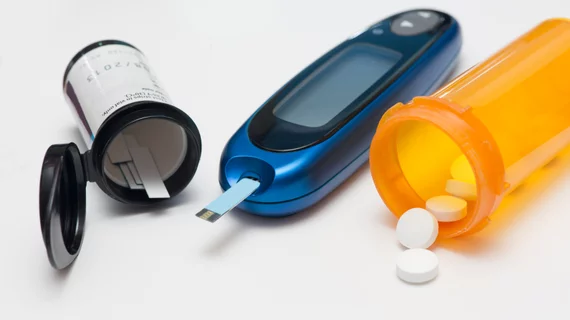Researchers develop 'surgery in a pill' capable of reversing type 2 diabetes
Researchers from Brigham and Women's Hospital (BWH) in Boston have developed “surgery in a pill” to treat type 2 diabetes by lowering blood glucose levels after a meal. The newly developed approach was outlined in a study published June 11 in Nature Materials.
Type 2 diabetes rates continue to increase, so researchers are searching for non-invasive treatments. In this study, researchers—led by Ali Tavakkoli, MD, co-director of the Center for Weight Management and Metabolic Surgery at BWH—outlined the development of an effective treatment capable of reversing type 2 diabetes. The treatment involved an oral agent given to rats that would coat the intestine to prevent nutrient contact and eliminate after-meal spikes in blood glucose.
"We envision a pill that a patient can take before a meal that transiently coats the gut to replicate the effects of surgery," said co-senior author Jeff Karp, PhD, a bioengineer and principal investigator at BWH. "Over the last several years, we've been working with our surgical colleagues on this idea and have developed a material that meets an important clinical need."
The oral agent included sucralfate, an FDA-approved drug that treats gastrointestinal ulcers by coating the lining of the intestine. The compound, known as LuCl, can be produced in a dry powder form and administered as an encapsulated pill.
"What we've developed here is essentially 'surgery in a pill,'" said co-lead author Yuhan Lee, PhD, a materials scientist in the BWH division of engineering in medicine. "We've used a bioengineering approach to formulate a pill that has good adhesion properties and can attach nicely to the gut in a preclinical model. And after a couple of hours, its effects dissipate."
In the study, researchers evaluated the effects of the pill in rats. LuCl was able to form a barrier in the intestine, preventing nutrient contact, which resulted in a 47 percent lower response to glucose. These results occurred an hour after the rats were given LuCl, with can be effective for three hours.
"Gastric bypass is one of the best studied surgeries in the world, and we know that it can lead to many benefits including positive effects for blood pressure, sleep apnea and certain forms of cancer, and a remarkably fast and weight-independent improvement in diabetes," said Tavakkoli, co-senior author of the study. "Having a transient coating that could mimic the effects of surgery would be a tremendous asset for patients and their care providers."

